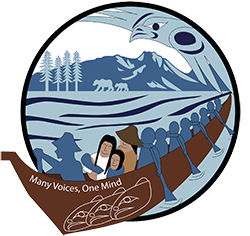Terminology
Indigenous or Aboriginal?
Note: The information below was gathered from Elders, Knowledge Keepers, and UBC's Indigenous Peoples: Language Guide
The original caretakers of this land were labeled as “Indians” when explorers mistakenly believed they had landed in India. In 1982, Canadian settlers replaced “Indian” with “Aboriginal”, to refer to First Nations, Inuit, and Métis people. In 2014, there was an official rejection of this term by several First Nations. “Native” is commonly used in the USA but is considered vague and outdated in Canada (and it has several negative connotations associated with it).
The meaning of the prefix “ab” can either be “from” or “away from”; therefore, some interpret “Aboriginal” as meaning “from original” while others interpret it as meaning “away from original” (often associated with ‘abnormal’). In contrast, the term “Indigenous” means “originating naturally in a particular place”, which most can agree respects our people’s connection to the land as its original inhabitants.
Indigenous people should decide the labels with which they identify. Those who are settlers in this land should have no say over what terms Indigenous people choose to refer to themselves. They should simply try to learn from, respect, and share the teachings they receive.
Indigenous people can refer to themselves in any way they want and should never be judged for the terms they choose to use. Many are reclaiming the word “Indian”, while others simply use it out of habit. Either way, that is their choice and their right.
Non-Indigenous people should never use the term “Indian” unless it is in the legal sense (e.g., “Indian Status”). Even then, it is more polite to simply use “Status” and avoid the possibility of offence.
“Indigenous” is an umbrella term used for First Nations, Métis, and Inuit peoples. It is used when unsure of which group someone belongs to or when referring to all three groups together. It is most respectful to be specific whenever possible. If we know that someone is Métis, we acknowledge that fact rather than using the more general term “Indigenous” when referring to them. In the same way, we only use “First Nations” when unsure of which First Nation someone is from or when referring to multiple different First Nations.
Terminology can be used to demoralize people, but it can also be used as a tool of empowerment. It is time to move away from colonial terms that wound and instead use terms that respect and honour those who were here from the beginning.
Unfortunately, "Indigenous" is not a perfect word and the journey may not be over. The term does not recognize the uniqueness of those indigenous to Turtle Island, as everybody is Indigenous to somewhere. Currently, it seems to be the most respectful word that includes First Nations, Métis, and Inuit. If the Indigenous (First Nations, Métis, and Inuit) community agrees upon new terminology, we will gladly update our language again as we strive to reflect respect and honour in the words we speak.
AIDP and ASCD are provincial programs, and the BC government has not officially transitioned to the use of “Indigenous”. We hope this change will take place soon and look forward to moving towards Indigenous Infant Development Programs and Indigenous Supported Child Development Programs.
Trauma / Healing
Simply put, “Intergenerational trauma, or generational trauma, happens when the trauma of an earlier generation gets passed down. https://www.webmd.com/mental-health/what-is-intergenerational-trauma
- A deeply distressing or disturbing experience (residential school, poverty, sexual abuse or violence etc.) passed on from grandparent/parent to child.
- Happens when those who experience the original trauma haven’t had the chance to heal- so it is felt by future generations
- Survivors pass on trauma to later generations when they don’t have the opportunity to participate in a way to heal or if it becomes too much.
- When left unchecked negative/destructive behaviours and/or poor mental health becomes the norm. Which leads to extending the reach of trauma to later generation. This can look like further abuse of others, addiction, poor relationships, negative parenting styles, disconnect from culture etc.
- Children internalize trauma and when they become adults can end up carrying it forward – becomes a cycle
When do we see it in ECE settings?
- Symptoms of intergenerational trauma can include, depression, low self esteem, behaviour issues, lack of self regulation of emotions- (anger, anxiety, depression), attachment issues, and more.
- This can look like acting out, anger, anxiety, and disconnect
What has happened to our ancestors (good or bad) will affect up to 7
generations. This can affect our children (in the present).
Territory / Land
Unceded lands: Lands that First Nations people never ceded/surrendered or legally signed away to the Crown or to Canada.
Traditional territory: The geographic area identified by a First nation as the land they and their ancestors traditionally occupied and used.
